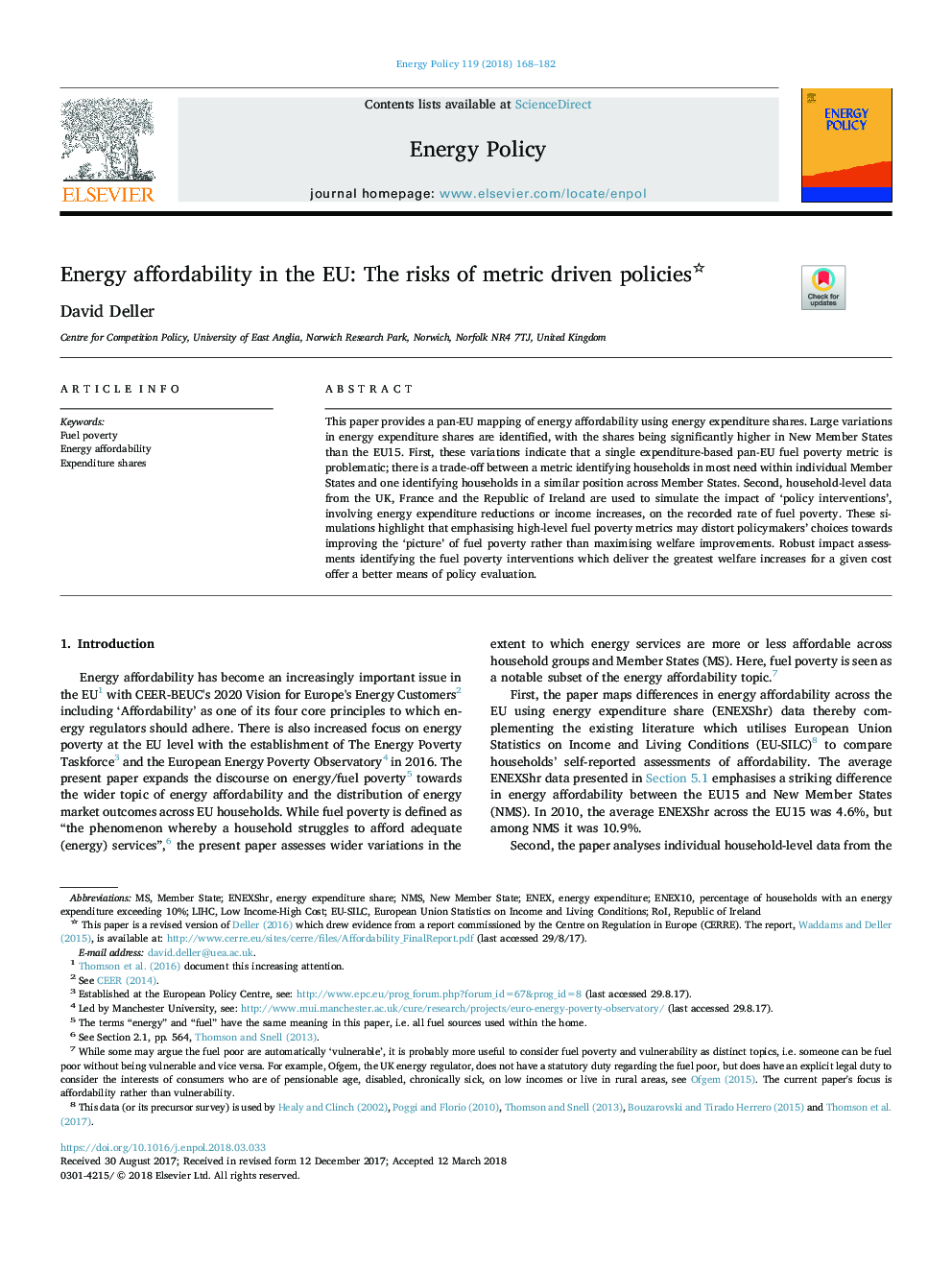| کد مقاله | کد نشریه | سال انتشار | مقاله انگلیسی | نسخه تمام متن |
|---|---|---|---|---|
| 7397007 | 1481239 | 2018 | 15 صفحه PDF | دانلود رایگان |
عنوان انگلیسی مقاله ISI
Energy affordability in the EU: The risks of metric driven policies
ترجمه فارسی عنوان
مقرون به صرفه بودن انرژی در اتحادیه اروپا: خطرات سیاست های مبتنی بر متریک
دانلود مقاله + سفارش ترجمه
دانلود مقاله ISI انگلیسی
رایگان برای ایرانیان
کلمات کلیدی
ترجمه چکیده
این مقاله نقشه یابی انرژی ارزان قیمت را با استفاده از هزینه های مصرف انرژی ارائه می دهد. تغییرات بزرگی در سهام مصرف انرژی شناسایی می شود، در حالی که سهام در کشورهای عضو جدید از اتحادیه اروپا به مراتب بالاتر است. اول، این تغییرات نشان می دهد که یک مؤلفۀ فقر سوختی اروپائی تنها بر اساس هزینه، مشکل ساز است؛ یک معامله بین متریک شناسایی خانوارهایی که بیشترین نیاز را در داخل کشورهای عضو دارد و یک خانواده شناسایی در موقعیت مشابه در سراسر کشورهای عضو وجود دارد. دوم، داده های سطح خانوار از انگلیس، فرانسه و جمهوری ایرلند برای شبیه سازی تاثیر مداخلات سیاست، شامل کاهش هزینه های انرژی و یا افزایش درآمد، بر میزان ثبت شده فقر سوخت استفاده می شود. این شبیه سازی ها نشان می دهد که تأکید بر معیارهای فقر در سطح بالا ممکن است انتخاب های سیاست گذاران را در جهت بهبود "تصویر" فقر سوخت تحریک کند تا به حداکثر رساندن بهبود رفاه. ارزیابی های اثرگذار بر روی تأمین مداخلات فقر سوختی که بیشترین رفاه را برای یک هزینه مشخص ارائه می دهند، یک ابزار بهتر برای ارزیابی سیاست است.
موضوعات مرتبط
مهندسی و علوم پایه
مهندسی انرژی
مهندسی انرژی و فناوری های برق
چکیده انگلیسی
This paper provides a pan-EU mapping of energy affordability using energy expenditure shares. Large variations in energy expenditure shares are identified, with the shares being significantly higher in New Member States than the EU15. First, these variations indicate that a single expenditure-based pan-EU fuel poverty metric is problematic; there is a trade-off between a metric identifying households in most need within individual Member States and one identifying households in a similar position across Member States. Second, household-level data from the UK, France and the Republic of Ireland are used to simulate the impact of 'policy interventions', involving energy expenditure reductions or income increases, on the recorded rate of fuel poverty. These simulations highlight that emphasising high-level fuel poverty metrics may distort policymakers' choices towards improving the 'picture' of fuel poverty rather than maximising welfare improvements. Robust impact assessments identifying the fuel poverty interventions which deliver the greatest welfare increases for a given cost offer a better means of policy evaluation.
ناشر
Database: Elsevier - ScienceDirect (ساینس دایرکت)
Journal: Energy Policy - Volume 119, August 2018, Pages 168-182
Journal: Energy Policy - Volume 119, August 2018, Pages 168-182
نویسندگان
David Deller,
